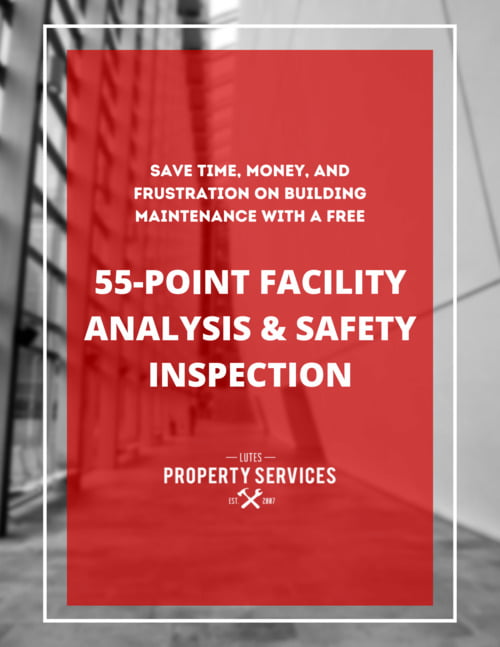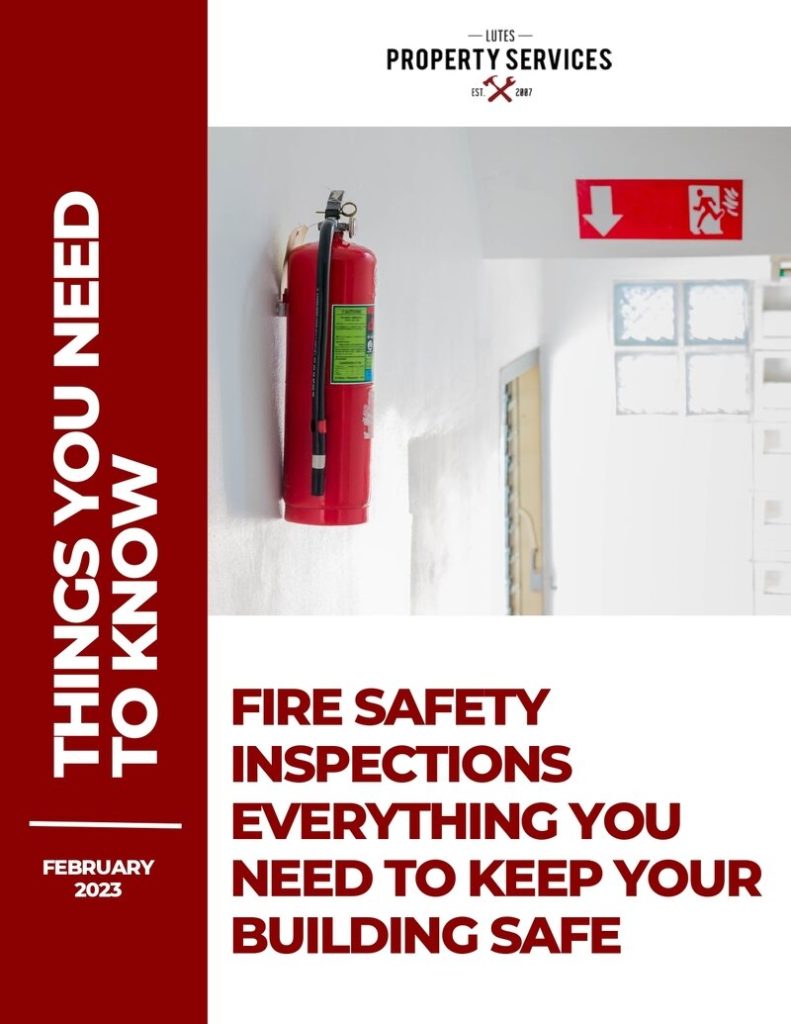Introduction
At Lutes Property Services, we understand the importance of preventive maintenance for commercial HVAC systems. Regularly scheduled maintenance helps to ensure that your system is operating efficiently and cost-effectively, while providing a comfortable environment for your employees and customers. In this article, we provide an overview of the preventive maintenance procedures that should be performed to maintain a commercial HVAC system. These procedures include checking and changing air filters, cleaning evaporator and condenser coils, cleaning the exterior unit, avoiding blockages, checking system controls, cleaning and tightening electrical connections, recharging refrigerant and repairing refrigerant leaks, checking ductwork and ensuring the drain system is clear. By performing these procedures regularly, you can ensure that your HVAC system works correctly and efficiently while keeping costs low.
Check and Change Air Filters
Maintaining air filters is an important part of preventive maintenance for HVAC systems. It is recommended that air filters are changed every three months, or more frequently if the system is used more often than normal. This helps to keep dust and other airborne particles from entering the system, which can cause damage and reduce efficiency.
Checking Air Filters
When checking air filters, it is important to look for signs of dirt buildup or clogging. If the filter appears dirty, it should be replaced as soon as possible. It is also important to check the size of the filter to ensure it is the correct size for the unit. A too-small filter can restrict airflow, while a too-large filter can allow unfiltered air into the system.
Changing Air Filters
When changing air filters, it is important to follow manufacturer instructions carefully. The new filter should be installed in the same direction as the old one, with arrows indicating airflow direction. After installation, make sure all edges are properly sealed and no gaps are present around the filter frame.

It is also important to dispose of old filters properly; they should not be thrown away with regular household garbage as they may contain hazardous materials such as asbestos or fiberglass particles. Instead, they should be taken to a recycling center or hazardous waste disposal facility for proper disposal.
By regularly checking and changing air filters in commercial HVAC systems, businesses can help ensure their systems run efficiently and effectively while keeping costs low over time.
Clean Evaporator and Condenser Coils
Evaporator and condenser coils are essential components of a commercial HVAC system, as they help to regulate the temperature of the air inside the building. To ensure that the system works correctly and efficiently, it is important to regularly clean these coils.
Cleaning Evaporator Coils
Evaporator coils are typically located inside the air handler unit, which is usually found on top of the furnace or in an attic space. To begin cleaning evaporator coils, start by turning off power to the unit and removing any access panels or filters. Next, use a vacuum cleaner with a soft-bristled brush attachment to remove dirt and debris from the coil fins. Finally, spray a non-acidic coil cleaner onto the fins and allow it to sit for 10-15 minutes before rinsing it off with water.
Cleaning Condenser Coils
The condenser coils are typically located in an outdoor unit that houses both the compressor and fan motor. Before beginning cleaning, turn off power to the unit and remove any access panels or filters. Use a garden hose with a nozzle attachment to rinse off dirt and debris from both sides of the coil fins. If there is heavy buildup on either side of the fins, use a soft bristle brush to gently scrub away any stubborn grime before rinsing again with water. Finally, spray a non-acidic coil cleaner onto both sides of the fins and allow it to sit for 10-15 minutes before rinsing it off with water.
Cleaning evaporator and condenser coils is an important part of regular preventive maintenance for commercial HVAC systems. Taking care of these components helps keep your system running efficiently while also reducing energy costs over time.
Clean the Exterior Unit
Cleaning the exterior unit of a commercial HVAC system is an important preventive maintenance procedure that should be performed regularly. The outdoor unit is exposed to the elements and can easily become clogged with dirt, debris, leaves, and other materials. This can cause the unit to operate inefficiently and increase energy costs. To prevent this from happening, it is important to clean the exterior unit on a regular basis.
Steps for Cleaning the Exterior Unit
The first step in cleaning the exterior unit is to turn off the power to the unit and disconnect any electrical connections. Once this is done, you will need to remove any debris or vegetation that has accumulated around the unit. This may include leaves, grass clippings, branches, or other material that could block airflow or interfere with operation. After all of this has been removed, use a garden hose with a spray nozzle to rinse off any remaining dirt and debris from the outside of the unit.
Once all of the dirt and debris have been removed, you will need to inspect all of the components for visible damage such as cracks or corrosion. If any damage is found, it should be repaired or replaced before continuing with cleaning procedures. After this inspection is complete, use a soft brush or cloth to gently scrub away any remaining dirt and grime from the surface of the exterior unit. Finally, use a vacuum cleaner with a crevice attachment to remove any dust or dirt from inside of vents and openings on the exterior unit.
Conclusion
Cleaning the exterior unit of a commercial HVAC system is an important preventive maintenance procedure that should be performed regularly. By following these steps and inspecting all components for visible signs of damage before beginning cleaning procedures you can ensure that your HVAC system operates efficiently while keeping energy costs low.
Avoid Blockages
Blockages in a commercial HVAC system can lead to serious problems with the system’s performance and efficiency. Regularly checking for blockages is an important part of preventive maintenance that should be performed on a regular basis. The most common causes of blockages are leaves, dirt, debris, and other materials that can accumulate in the outdoor unit or the ductwork. It is important to check these areas regularly and remove any blockages as soon as possible.
Outdoor Unit
The outdoor unit should be checked for any blockages that may have occurred due to leaves, dirt, or debris. If there are any blockages present, they should be removed immediately to avoid further damage to the system. Additionally, it is important to ensure that the area around the outdoor unit is kept clear of any vegetation or debris that could potentially cause a blockage.
Ductwork
The ductwork should also be checked regularly for any blockages that may have occurred due to dirt, dust, or other debris. If there are any blockages present, they should be removed immediately in order to maintain proper air flow through the system. Additionally, it is important to check for any signs of corrosion or damage that could potentially cause a blockage in the future.

By regularly performing preventive maintenance procedures such as avoiding blockages in both the outdoor unit and ductwork, commercial HVAC systems can remain working correctly and efficiently while keeping costs low. This will help ensure that businesses continue to receive optimal performance from their HVAC systems without having to worry about costly repairs or replacements down the road.
Professional Maintenance Checks
The most effective way to ensure that a commercial HVAC system is running efficiently and cost-effectively is to have it professionally inspected and serviced on a regular basis. Professional maintenance checks should include a comprehensive inspection of the entire system, as well as any necessary repairs or replacements.
Check System Controls
A professional technician will inspect all of the components of the HVAC system, including the thermostat, fan controls, and motorized dampers. They will also check for any signs of wear or damage, such as loose connections or faulty wiring. The technician may also adjust settings to ensure that the system is running at peak efficiency.
Clean and Tighten Electrical Connections
It is important to regularly inspect all electrical connections in the HVAC system for corrosion or other signs of wear and tear. The technician will clean any corroded connections with an appropriate cleaner and tighten them up if necessary. This helps prevent potential problems with the system, such as shorts or power surges.
Recharge Refrigerant and Repair Refrigerant Leaks
The refrigerant in a commercial HVAC system should be checked periodically to make sure it is at the correct level. If it is low, the technician can recharge it with new refrigerant. Additionally, they will check for any leaks in the system and repair them if necessary.
Check Ductwork
The ductwork in a commercial HVAC system should be inspected periodically for any signs of damage or blockages. The technician will check for any holes, cracks, or other openings that could allow air leakage from the ducts, which can reduce efficiency and increase energy costs. They will also look for any blockages caused by debris buildup or other obstructions that could restrict airflow through the system.
Ensure Drain System Is Clear
Finally, a professional technician will inspect the drain line of the HVAC system to make sure it is clear of debris or other obstructions that could cause water damage to the unit or surrounding areas. They may use specialized equipment to flush out any clogs in order to prevent costly repairs down the road.
Main Idea: Professional maintenance checks should include a comprehensive inspection of the HVAC system, with repairs/replacements and cleaning/tightening of electrical connections. Refrigerant levels should be checked and any leaks repaired. Ductwork and drain systems must also be inspected.
At Lutes Property Services, we understand the importance of preventive maintenance for commercial HVAC systems. Performing regular maintenance procedures like cleaning evaporator and condenser coils, avoiding blockages, checking system controls, recharging refrigerant and repairing leaks, and ensuring the drain system is clear can help keep your HVAC system running smoothly and efficiently while keeping costs low. Our experienced team of professionals can help you with all your preventive maintenance needs. Contact us today to get started!


